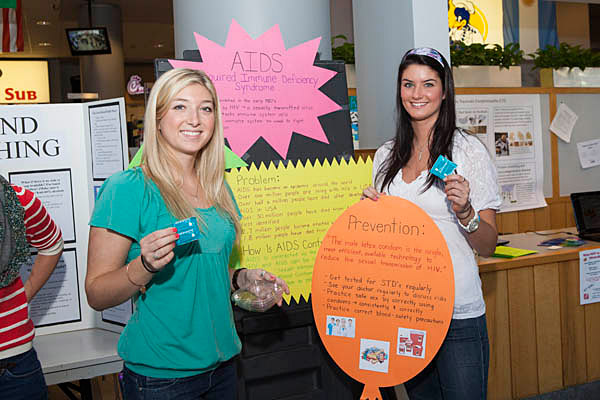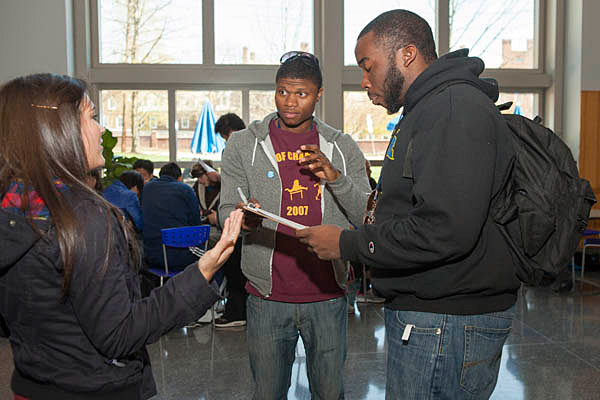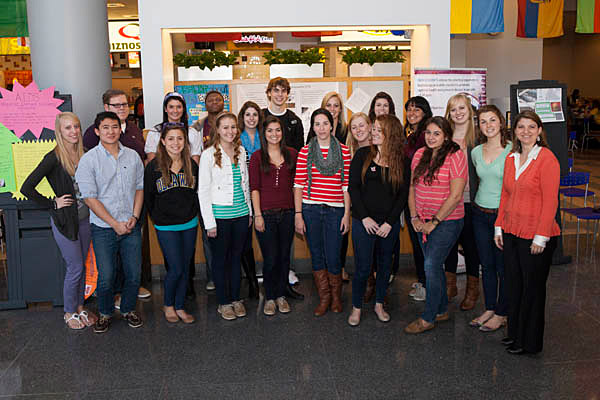


A healthier America
Students raise awareness of issues during National Public Health Week
2:21 p.m., April 4, 2012--This year’s theme for National Public Health Week is “A Healthier America Begins Today: Join the Movement.”
Led by Mia Papas, assistant professor in the Department of Behavioral Health and Nutrition, nine teams of students at the University of Delaware shared information aimed at getting the UD community to join that movement as National Public Health Week was kicked off on Monday, April 2.
Campus Stories
From graduates, faculty
Doctoral hooding
Held in the Trabant University Center, the event showcased projects carried out by the students in UD’s Introduction to Public Health class.
“I divided the class into groups and asked them to raise awareness of something they were passionate about in the field of public health using whatever means they thought would be most effective,” Papas says.
For some of the groups, the most difficult part of the assignment may have been narrowing their choices. The field of public health encompasses a wide range of issues, including active living and healthy eating, communicable diseases, reproductive and sexual health, mental and emotional well-being, and the use of alcohol, tobacco and other drugs.
One group developed a petition to make UD a smoke-free campus, while another collected eyeglasses for a national program called OneSight.
Other groups offered information about healthy eating choices, clean water programs, depression, and limiting the spread of infection through hand washing. A poster shared the results of cutting-edge research being conducted in the area of injury and neurologic function.
Health behavior science majors Meghan Clarke and Meghan Schwarz prepared a poster on sexually transmitted infections and discreetly handed out condoms from a plain brown paper bag. “College students don’t understand how widespread AIDS and other STIs are on campus,” Schwarz said. “They think it’s just something that happens in Africa.”
Kaitlyn Barkley, a biochemistry major, and Raul Reyna, a biology major, took full advantage of social media to spread the word about their OneSight project—they sent out a mass email and posted on Facebook. Two hours into the three-hour event at Trabant, they had already collected almost 100 pairs of used glasses for people in need.
OneSight is supported by Luxxotica Group, which includes Sunglass Hut, where Reyna works, so the project was a good fit for him. But Barkley pointed out that they chose this issue because access to vision care is a subject most people don’t think about.
UD is currently growing its programs in public health, with the addition of a minor in 2011. In the first year, participation jumped from 15 students to 80.
“We thought it would take awhile for the new minor to catch on,” Papas says, “but that hasn’t been the case. Right now, we’re exploring creative ways to accommodate all of the students who want to select it.”
“Public health really is an interdisciplinary science, and it’s non-partisan,” she adds. “We’re finding that students in a wide variety of majors are attracted to the minor. Many are health behavior science majors, but we also have students from biology, biochemistry, economics, nursing, engineering, animal science, sociology, and psychology.”
Papas points to statistics that show 36 percent of U.S. adults and 17 percent of children are obese, 75 percent of Americans fail to meet the minimum requirement of 30 minutes of daily physical activity, and 46 million American have no health insurance.
“These are major problems that we as a society are grappling with,” she says. “Through our programs at UD, we are educating the next generation of public health practitioners who will need to develop creative solutions to these issues to achieve a healthier America.”
Anyone interested in learning more about public health programs on campus can contact Papas at mpapas@udel.edu.
About NPHW
Since 1995, when the first full week of April was declared National Public Health Week (NPHW), communities across the United States have observed NPHW as a time to recognize the contributions of public health and highlight issues that are important to improving the public’s health.
The American Public Health Association (APHA) serves as the organizer of NPHW and develops a national campaign to educate the public, policymakers and practitioners about issues related to that year’s theme. APHA creates comprehensive planning, organizing and outreach materials that can be used during and after the week to raise awareness.
Article by Diane Kukich
Photos by Ambre Alexander











